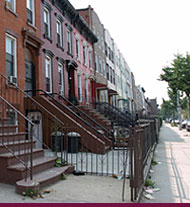
 |
|
|

Taking Root in States and Cities |
Background
On June 25, 2001, President Bush visited the U.S. Conference of Mayors (USCM) annual meeting in Detroit to accept the mayors’ official endorsement of the Faith-Based and Community Initiative (FBCI). Following that event, the national mayors’ group began planning their own initiative, which was formally announced at the 72nd Annual Meeting in 2004. Then-USCM president James A. Garner (Hempstead, NY) remarked at the time:
For many years, cities have worked closely in partnership with faith and community serving organizations. These collaborations have played a critical role in improving the lives of residents in many cities by providing a plethora of vital services — including job training and employment services, recidivism reduction, health support services, services related to crime prevention and intervention, mentoring for children of prisoners, domestic violence prevention and intervention and housing services.
To move this vision into action, the U.S. Conference of Mayors established a Faith-Based and Community Initiatives Task Force designed to inform, educate, and train mayors, city-designated faith-based liaisons, and other public servants on how to best engage faith-based and community organizations for more effective partnerships and service. Philadelphia Mayor John Street and Miami Mayor Manny Diaz provided inaugural leadership for the Task Force at the same time they launched innovative solutions in their own cities.
Leadership at the Local Level
As Mayor Diaz assumes the presidency of the U.S. Conference of Mayors in June 2008, he continues to encourage partnerships with faith-based and community organizations (FBCOs), and his office leads by example. The Mayor’s Office of Faith-Based and Community Initiatives engages FBCOs to address priorities such as reducing gang violence, youth offender re-entry, and homelessness, and strengthening families.
In cities of all sizes across the United States, mayors are working closely with faith-based and community organizations to assist their neighbors in need.
Equipping Cities for Future Expansion
Following his work in helping design and launch President Bush’s FBCI, former Indianapolis Mayor Steve Goldsmith joined Harvard University to lead a project aimed at strengthening city government partnerships with neighborhood faith-based and community organizations. Harvard’s activities included an executive forum in 2002 with more than 30 mayors, religious and civic leaders, and academics. The forum was designed to equip local public administrators for effective collaboration with neighborhood faith-based groups and to produce a series of living case studies of such best practices.
The signature product in this series is “City Hall and Religion: An Online Curriculum for Public Managers,” administered by the JFK School of Government at Harvard. This material features case studies written by leading scholars in the field about some of the most innovative partnerships under way in America’s cities. Designed for both illumination and replication by would-be innovators, the series is organized by four themes:
Municipal leaders in cities of all sizes are learning from each other and working closely with faith-based and community organizations to address the most critical social welfare issues in their respective communities.
More Information